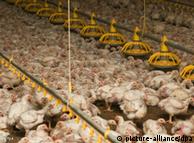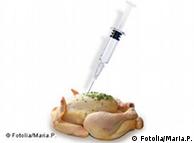|
美國將嚴格限制養殖業抗生素使用
健康2013年12月12日
華盛頓——周三,美國食品藥品監督管理局(Food and Drug Administration,簡稱FDA)表示,它正開始逐步禁止在食用動物的養殖過程中使用一些關鍵的抗生素,這項重大的政策轉變可能會為工業化養殖和人體健康帶來深遠影響。
這項改革會在今後三年內生效,是數十年來聯邦政府首次認真着手限制
抗生素在農畜飼養中的廣泛使用。隨着對人體健康非常重要的一些藥物的有效性減弱,以及對抗生素產生耐藥性的一些細菌導致的死亡病例數飛漲,要求採取行動的
呼聲日漸加強。食品生產商說他們會遵守新規,但一些公共健康倡導人士卻擔心,漏洞可能會讓新政策形同虛設。
「這是20年來應對這個重要公共健康問題的第一步重大舉措,」FDA前局長戴維·凱斯勒(David Kessler)說,他一直對FDA在抗生素方面的作為持批評態度。「每一個人都應該充分認識到,這會給廣泛而長期存在的產業慣例帶來重大改進。」
抗生素是20世紀的特效藥之一,專家們說,起初抗生素在人畜的應用
上不加任何區分。到20世紀70年代,公共衛生官員們已經開始擔心,抗生素的濫用正導致人體中出現一些對治療產生耐藥性的傳染病。但是多年以來,即使是聯
邦官員們最微不足道的舉措,也受到了勢力強大的食品業及其在國會中的遊說力量的阻撓。自那以後,抗生素在動物中的濫用和抗藥性已經成了世界範圍內公共衛生
領域的重大問題之一,每年至少有200萬美國人患病,其中約2.3萬人死於耐抗生素感染。
FDA已經對這些規則做出改變,這樣一來,食用動物生產商就不能再使用抗生素來加快動物的生長。為了達到這一目的,FDA會要求抗生素的生產廠家在標籤上做出改變,如此一來,農場主們再使用這種藥物來刺激動物的生長就是違法的了。

Brian C. Frank for The New York Times
在醫藥公司方面,這些2012年提出的改革舉措並沒有做出強制性約
束。但是FDA官員表示,基於公共評論期間的一些討論,他們相信醫藥公司會遵守新規。周三,FDA官員在與記者的一次通話中表示,生產了市場上多數抗生素
藥物的兩家醫藥公司已經表明了他們的參與意向。醫藥公司會有三個月的時間來告知FDA他們是否會改變標籤,並用三年的時間來實施新規。
除此以外,FDA還要求有執照的獸醫監督抗生素的使用,這其實就是要求,農場主和牧場主想要為他們的動物使用抗生素,就要先取得處方。FDA主管食品和獸葯的副局長邁克爾·泰勒(Michael Taylor)說,比較這個行業以往的做法,這是一個極其重大的改變。
「如今的畜禽生產商可以去當地的飼料商店購買抗生素,無需處方,完全沒有任何監管,而實施了新規則會有很大的不同,」泰勒說道。
倡導消費者健康的人士說,新規是否能改變動物的抗生素用量還很難說。他們說,有一個漏洞會允許畜禽生產商繼續使用同樣低劑量的抗生素,他們可以說這些抗生素的使用是為了預防動物生病,是必要的,因此就可以繞過禁止將抗生素用作生長刺激劑的新規。
「即使所有允許生長刺激的許可被主動收回,許多抗生素依然能夠以類
似的方式使用下去,」約翰·霍普金斯大學(Johns Hopkins)宜居未來研究中心(Center for a Livable
Future)的科學家基夫·納赫曼(Keeve Nachman)說道。
納赫曼說,一個更有意義的舉措會是禁止將抗生素用作疾病的預防,迄今為止,FDA還沒有採取這一步。這樣做會把抗生素的使用僅僅限於針對獸醫所診斷疾病的治療,這個範圍就要小得多,他說。
藥商碩騰(Zoetis)表達了對這些新舉措的認可。「我們認為,決定對食用動物使用抗生素的過程應該有獸醫的參與,這是為了動物的健康,也是為了食品供應的安全,」公司在一份聲明中說道。
但是農場主單純為了刺激生長而使用抗生素的範圍有多廣,還不得而知。農場中約80%的抗生素會混入飼料中,還有17%放入水中。僅有3%是通過注射使用。
倡導公共健康的人士對這一舉措給予了肯定。
「限制將抗生素用來刺激生長,增加獸醫對使用的監管,這是一個充滿
希望的開端,」皮尤慈善信託基金會(Pew Charitable Trusts)負責人體健康和工業化養殖行動的主任勞拉·羅傑斯(Laura
Rogers)說道。「大型製藥公司表示它們會遵守,FDA承認還有更多的工作要做,這讓我們感到尤為鼓舞。」
抗生素的主要生產商碩騰的女發言人表示,他們不認為這項改革會對公司的收入帶來很大影響,因為它的許多產品同時也獲得了醫療用途的許可。納赫曼博士說,從這點上也可以看出,新規可能並不會讓抗生素的總體使用有所減少。
F.D.A. to Phase Out Use of Some Antibiotics in Animals Raised for Meat
December 12, 2013
WASHINGTON — The Food and Drug
Administration said Wednesday that it was beginning to phase out the use
of some critical antibiotics in animals raised for meat, a major policy
shift that could have far-reaching implications for industrial farming
and human health.
The change, which will take
effect over the next three years, is the first serious attempt by the
federal government to curb the broad use of antibiotics in farm animals
in decades. Pressure for action has mounted as the effectiveness of
drugs important for human health has declined, and deaths from bugs
resistant to antibiotics have soared. Food producers said they will
abide by the new rules, but some public health advocates voiced concerns
that loopholes could render the new policy toothless.
“This is the first significant
step in dealing with this important public health concern in twenty
years,” said David Kessler, a former F.D.A. commissioner who has been
critical of the agency’s track record on antibiotics. “No one should
underestimate how big a lift this has been in changing widespread and
long entrenched industry practices.”
Antibiotics, one of the wonder
drugs of the 20th century, were initially used indiscriminately in
people and animals, experts say. By the 1970s, public health officials
had become worried that overuse was leading to the development of
infections resistant to treatment in humans. But for years, modest
efforts by federal officials were thwarted by the powerful food industry
and its lobbying power in Congress. The issue of antibiotic overuse in
animals and drug resistance has since become one of the leading public
health concerns worldwide with at least 2 million Americans falling sick
every year and about 23,000 dying from antibiotic-resistant infections.
The agency has changed the
rules so that food animal producers would no longer be able to use
antibiotics to make animals grow faster. It will accomplish that by
asking manufacturers of the drugs to change the labels in a way that
would make it illegal for farmers to use the medicines for growth
promotion.
The changes, which were originally proposed in
2012, are voluntary for drug companies. But F.D.A. officials said they
believed the companies would comply, based on discussions during the
public comment period. The two drug makers that represent a majority of
such drug products have already stated their intent to participate,
F.D.A. officials said on a call for reporters on Wednesday. Companies
will have three months to tell the agency whether they will change the
labels, and three years to carry out the new rules.
Additionally, the agency is
requiring that licensed veterinarians supervise the use of antibiotics,
effectively requiring farmers and ranchers to obtain prescriptions in
order to be able to use the drugs for their animals. Michael Taylor, the
F.D.A.'s deputy commissioner for foods and veterinary medicine said
this was a substantial change from the way the industry has operated in
the past.
“It’s a big shift from the
current situation, in which animal producers can go to local feed store
and buy these medicines over the counter and there is no oversight at
all,” Mr.Taylor said.
Consumer health advocates say
it is an open question whether the new rules will change how much
antibiotics are consumed by animals. They say that a loophole will allow
animal producers to keep using the same low doses of antibiotics, by
arguing that they were needed to keep animals from getting sick, and
thereby avoiding the new ban on use for growth promotion.
“Even if all growth promotion
approvals were withdrawn voluntarily, many antibiotics could still be
used in similar ways,” said Keeve Nachman, a scientist at the Johns
Hopkins Center for a Livable Future.
A more meaningful move, Dr.
Nachman said, would be to ban the use of antibiotics for the prevention
of disease, a step the F.D.A. so far has not taken. That would limit
antibiotic uses to treatment of sickness that was diagnosed by a
veterinarian, a much narrower category, he said.
One drug producer, Zoetis, said
it approved of the changes. “We believe that veterinarians should be
involved in decisions regarding antibiotic use in food animals for the
health of the animal and for the safety of the food supply,” the company
said in a statement.
Just how broadly farmers use
antibiotics simply to promote animal growth is unknown. About 80 percent
of antibiotics used on farms are given through feed, and an additional
17 percent are given in water. Just 3 percent are given by injection.
Public health advocates applauded the move.
“Restricting the use of
antibiotics for growth promotion and increasing veterinary oversight is a
promising start,” said Laura Rogers, director of the Pew Charitable
Trusts’ human health and industrial farming campaign. “We’re
particularly encouraged that major drug makers are indicating they will
comply and that the F.D.A. acknowledges there is still more work to do.”
A spokeswoman for Zoetis, a
major producer, said the change was not expected to have a big effect on
the revenues of the company because many of its drug products were also
approved for therapeutic uses. Dr. Nachman said that was an indication
that overall use might not decline under the new rules.
新闻报道 | 2012.01.10
德国人面临“被抗生”
在今年夏天刚刚经过埃希大肠杆菌冲击的德国人再次面临"病从口入"的挑战,这次抽查的20种鸡肉食品中有11种带有抗药性的病菌,吃了这些抗生鸡,一些抗 药性的病菌会留在人体内。德国联邦风险评估研究所食品安全部发言人昆得克(Jörgen Thier-Kundke)说,这些抗生鸡虽然吃起来味道和有机鸡肉一样鲜美,并且价格便宜,可是下了肚之后却后患无穷,他说:"这种带有耐药菌的抗生素 被摄入人体后,这些耐药菌会让人体产生抗药性,使药物作用减弱,甚至全然不起作用,包括其他的抗生素。这样,人们一旦生病,可是药物却起不了应有的作用, 治愈的可能性减小。"
治病药不是预防针
北威州环境局去年11月份调查数据显示,北威州近千家养鸡场中,超过96%的鸡喂过抗生素。而且这个数字不仅反映出该州,也基本反映了全德的情况。一位不 愿透露姓名的有机养殖场主表示,德国大多数养殖场频频使用抗生素是要保持家禽的健康。在大型养殖场,肉食鸡往往在狭窄的空间里生存,如果一旦有一只鸡生病 很容易就殃及一大群鸡。大多养殖场防患于未然,为了最大程度上杜绝一批肉食鸡被传染疾病,按大约1%~2%的比例把抗生素添加到饲料中,发挥预防性作用。 根据药品法,抗生素虽然是"处方药",只能用于生病的家禽,而且只能从兽医那里获得使用许可,可是事实上,处方并不难要。另外,虽然在欧盟之内禁止使用含 有抗生素的饲料,可是带有抗生素的生长促进剂无疑是让肉食鸡快速长大最有效率的饲料之一。
 改善家禽生存条件才是关键
改善家禽生存条件才是关键联邦农业及消费者保护部长埃格纳提交的改革草案中包括:屠宰主必须报告动物整个生命周期的药物治疗,而不是像现有条例中仅记录动物屠宰七天前的情况。在监 管方面也要加强监督。德国农民协会和养鸡业协会发言人赫维斯(Christiane Riewerts)表示,在2010年,德国人均鸡肉消费量每年为20公斤左右。随着近几年人均食用的鸡肉类食品越来越多,人类"被抗生"的机率也越来越 大,减少抗生鸡的出现刻不容缓:"在未来五年内我们希望通过各种措施减少30%的抗生素使用量。这是一个雄心勃勃的目标,我们希望通过更好地记录和监管抗 生素的使用达到这个目标,要从根本上减少家禽发病率,更好的改善养殖场情况,使禽类有更多的生存空间,改善鸡窝卫生、给饲料增加营养。"
赫维斯补充道,尽管有些鸡肉类食品含有抗生素,不过消费者保护和食品安全调查显示,超市里面的鸡肉类产品不含有对人体有害的抗生素,从这个角度来说,消费者仍可食用德国的鸡肉制品。
不仅在德国,在整个欧洲,这种使人体产生抗药性的耐药菌也令人担忧,欧洲疾病预防中心总监斯鹏格(Marc Sprenger)接受路透社采访时表示,现在如果不采取一些措施,未来面对病毒性感染时,医生很有可能找不到可以对付耐药菌的药物,束手无策的看着病人 无药可救。
作者:文暮
责编:李鱼

沒有留言:
張貼留言